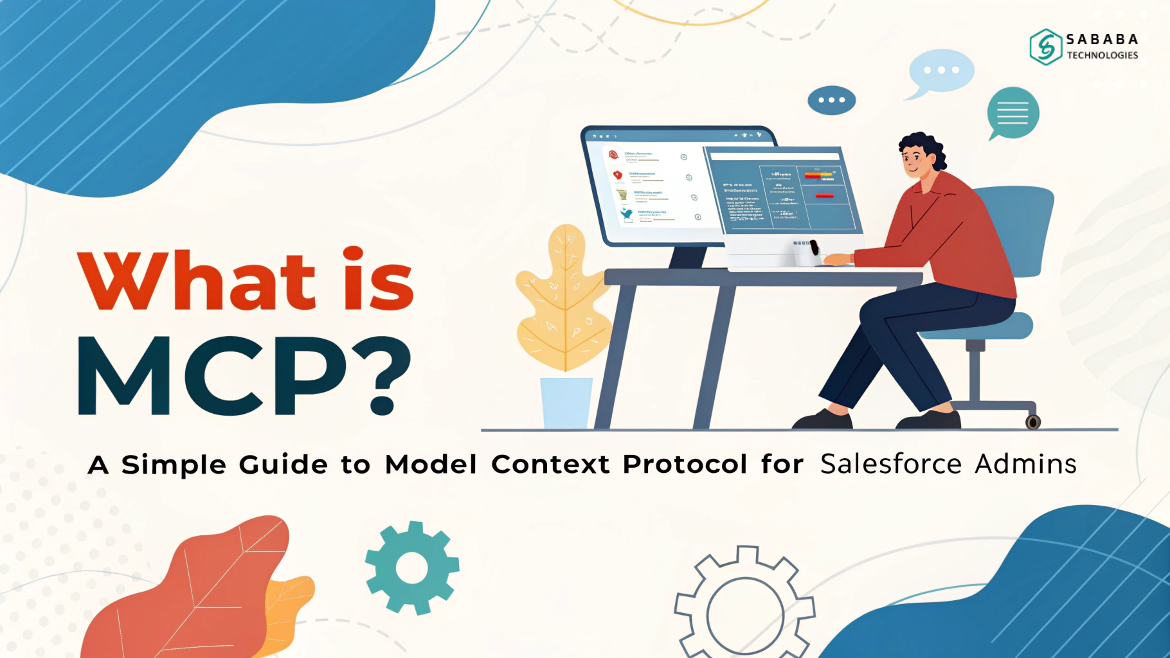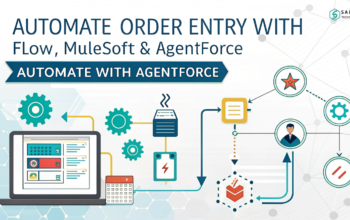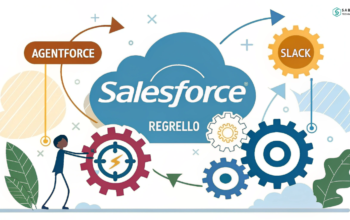Learn how Model Context Protocol (MCP) empowers Salesforce Admins to streamline integrations, enhance Agentforce, and simplify workflows.
The AI landscape is shifting rapidly, and every new development brings both opportunities and challenges. For Salesforce Admins, staying ahead means understanding how emerging standards influence day-to-day operations. In fact, one such advancement is the Model Context Protocol (MCP), which, more importantly, serves as a framework designed to help intelligent agents connect seamlessly with tools, data, and, ultimately, services.
This guide explains what MCP is, how it works, and why it matters for Salesforce environments.
Why Salesforce Admins Should Care About Model Context Protocol (MCP)
For years, integrating Salesforce with external applications required custom code, complex APIs, or middleware solutions. The Model Context Protocol (MCP) changes that equation. Instead of reinventing the wheel for every new integration, MCP provides a standardized way for agents to request context, access data, and perform actions.
For Salesforce Admins, this means:
- Faster adoption of new services without complex development.
- A consistent method for connecting Agentforce to enterprise systems.
- Reduced dependency on custom integrations and third-party connectors.
The Core Components of MCP
To understand the potential impact, it’s useful to examine the building blocks of the Model Context Protocol (MCP):
- Host – The platform where the agent operates (e.g., Agentforce).
- Client – The bridge that communicates with MCP servers.
- Server – The endpoint exposing actions, resources, and prompts.
- Actions – Defined operations agents can execute.
- Resources – Structured data sources agents can query.
- Prompts – Reusable templates that guide agent workflows.
For Salesforce Admins, this structure translates into a more predictable and manageable integration process.
Context: The Critical Factor
Without context, AI delivers incomplete or misleading results. MCP ensures that agents not only access tools but also understand the context behind them. Imagine the difference between “I need a ticket” and “I need a plane ticket from Chicago to San Francisco for Dreamforce 2025.” Clearly, the second example is far more specific, and as a result, it provides the clarity an agent needs to act effectively.
By leveraging Model Context Protocol (MCP), Salesforce Admins can give Agentforce agents the context required to handle tasks with accuracy and reliability.
How Salesforce Admins Can Use MCP in Practice
Although MCP is still emerging, it will soon become more visible across Salesforce platforms. Here’s what Salesforce Admins can expect:
- Discover functionality – Partners will publish MCP servers on AgentExchange.
- Register services – Admins can add those services to their org without extensive coding.
- Connect agents – Using Agent Builder, admins will link agents to MCP-powered functionality.
- Test workflows – The Testing Center will allow validation before production rollout.
- Optimize results – Command Center will help refine agent performance using MCP connections.
This progression empowers admins to expand capabilities while reducing technical overhead.
The Strategic Advantage for Salesforce Admins
Embracing the Model Context Protocol (MCP) is not just about integration—it’s about future-proofing Salesforce environments. With a universal standard in place, Salesforce Admins gain:
- A simplified path to adopt new technologies.
- Greater confidence in system reliability.
- Flexibility to scale Agentforce without starting from scratch each time.
In short, MCP reduces complexity while unlocking innovation.
Summary
The Model Context Protocol (MCP) is set to reshape how Salesforce interacts with external systems. Moreover, for Salesforce Admins, it offers a streamlined, standardized, and scalable approach to agent functionality. By contrast with traditional integrations, MCP emphasizes context and consistency, and therefore, it bridges the gap between AI and real-world business processes.
The sooner admins familiarize themselves with MCP, the more prepared they will be to harness Agentforce’s evolving capabilities.
FAQs
1. What is Model Context Protocol (MCP)?
MCP is a standard that enables AI agents to connect with tools, services, and external applications in a structured, consistent way.
2. Why is MCP important for Salesforce Admins?
It reduces integration complexity, allowing Salesforce Admins to adopt new tools quickly and manage Agentforce with greater efficiency.
3. How does MCP improve AI performance?
By ensuring agents have the necessary context, MCP enables more accurate, reliable, and effective outcomes.
4. Will Salesforce natively support MCP?
Yes, Salesforce plans to surface MCP functionality through Agentforce, Agent Builder, and other tools in the ecosystem.
5. Do Salesforce Admins need technical expertise to use MCP?
Not necessarily. Most of the heavy lifting will be handled by the platform, leaving admins to configure and manage connections rather than build them from scratch.
Feeling more like puzzles than solutions? That’s when Sababa steps in.
At Sababa Technologies, we’re not just consultants, we’re your tech-savvy sidekicks. Whether you’re wrestling with CRM chaos, dreaming of seamless automations, or just need a friendly expert to point you in the right direction… we’ve got your back.
Let’s turn your moments into “Aha, that’s genius!”
Chat with our team or shoot us a note at support@sababatechnologies.com. No robots, no jargon, No sales pitches —just real humans, smart solutions and high-fives.
P.S. First coffee’s on us if you mention this blog post!



